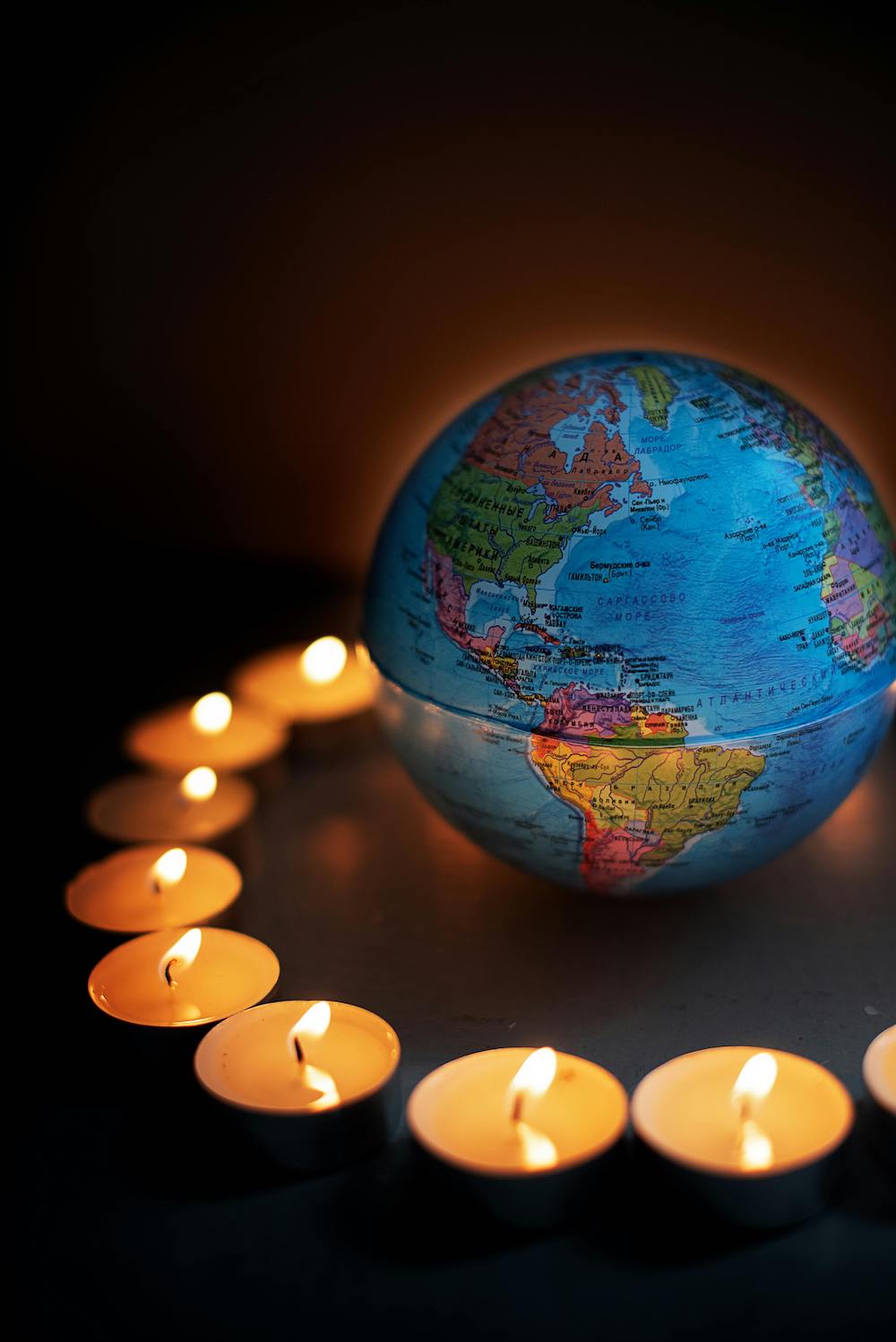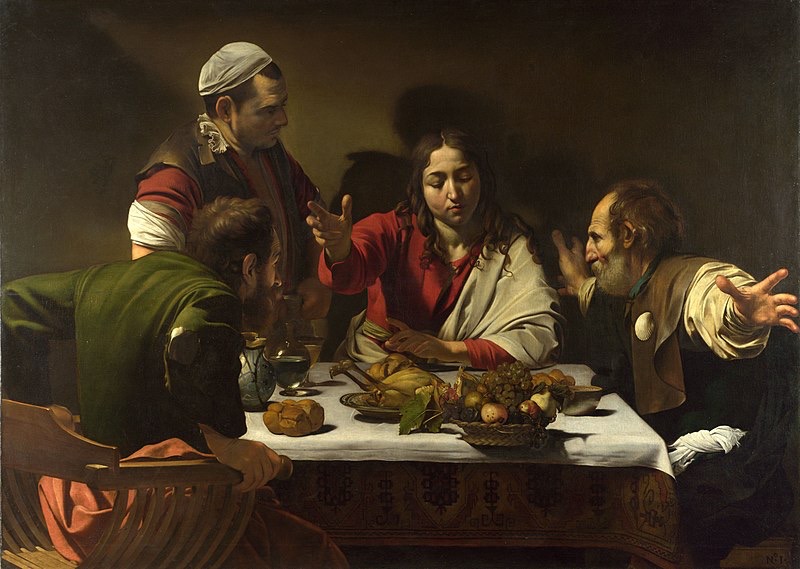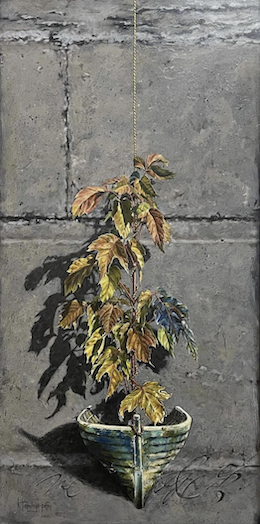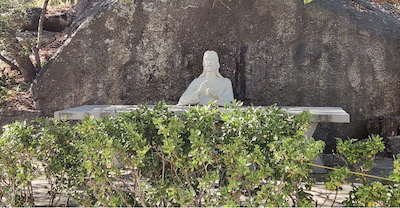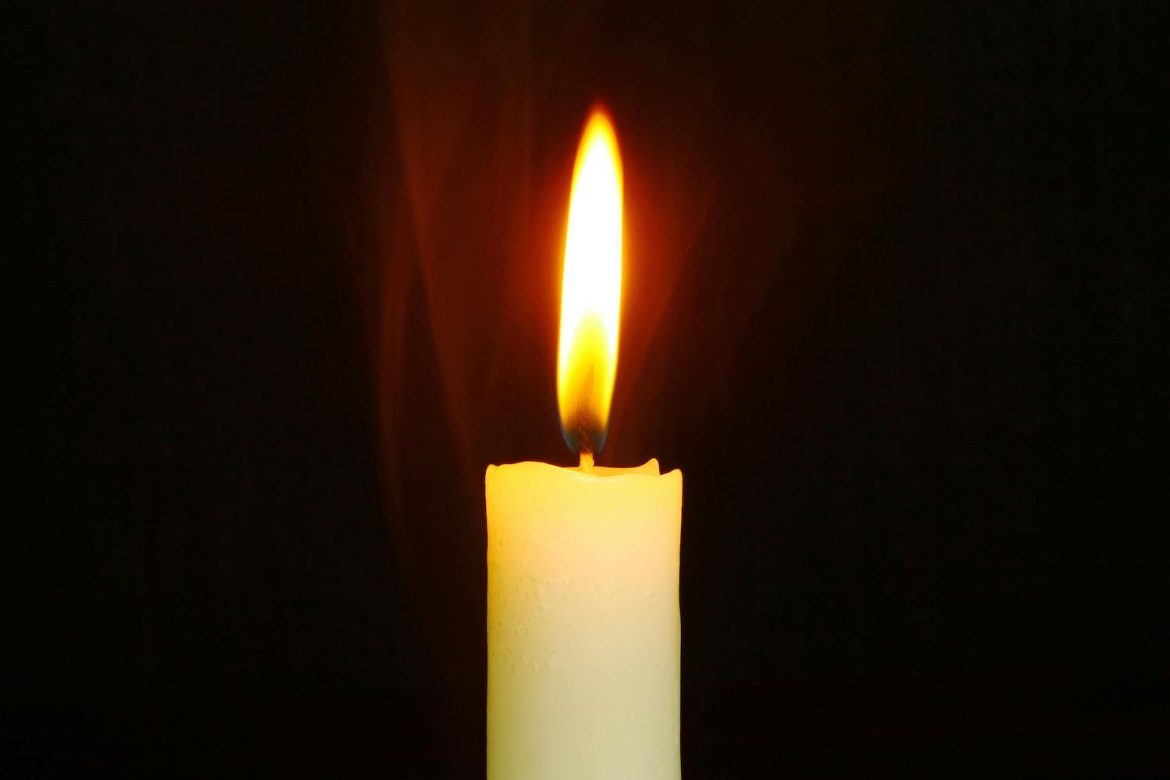Easter has come and gone. At least it has for many of us. Yet Easter is not just a day, it is the whole season from now until Pentecost. It is not the culmination of the gospel. It is just the beginning. The beginning of God’s new world of justice and peace and abundance. Sound like the world we live in? No it doesn’t. We still have a lot of work to do. However, Easter is the season to show others what kind of world we believe Jesus’ resurrection ushered into our broken world. It is a season to get out and practice hospitality, compassion, love, healing, generosity and care for creation. It is a season to show by our words and actions that we really do believe Jesus is indeed alive and is transforming our world… through us!
In N.T. Wright’s words which I quoted in yesterday’s Meditation Monday: Living Into the Resurrection: Jesus is risen, therefore God’s new world has begun. Jesus is risen, the world have been redeemed. Jesus is risen, his followers have a new job to do to bring the life of heaven to birth in actual, physical earthly reality.” You might also like to check out my Easter guide (available for free download) A Journey Into God’s Resurrection Created World in which I attempt to help us envision this world and how to live into it.
“What kind of God do we want to incarnate to our world? Is it a God of love and compassion who leaves ninety-nine sheep in order to rescue one that has gone astray, or one who constantly accuses those who do not follow God’s ways? Is it a God who gets his hands dirty by entering, in a very personal and human way, into the pain and suffering of our world, or one who inflicts pain and anguish as punishment for our sins? Is it a God who celebrates life with enthusiasm by turning water into wine at a wedding, or one who strips us of our joy by placing heavy burdens on our shoulders? Is it a God who hears our cries and brings justice for the poor and oppressed, or one who stands aloof and indifferent to our pain?”
Karen Wilk also talks about the challenges of practicing resurrection in her poem Practice Resurrection. As she says it is much easier in the spring when everything is new, but not so easy when the ship is stuck in the muck. Ellen Haroutunian also talks about resurrection living in her wonderful article Holy Fools Can Heal the World I love her description of Jesus as the archetypal Holy Fool and how holy foolishness bids us listen to those we know are wrong, As she says “The ability to extend pardon and even love to those who have hurt us is what makes us most like Jesus, the Holy Fool.”
In the last few days of Holy Week in A Jahrzeit During Lent: Bill Borror reminds us of the paradoxes of grief and love, of death and hope. On Maundy Thursday June Friesen reminded us of what this celebration is all about and in her Freerange Friday: Good Friday Cups Lilly Lewin helped us walk through Good Friday as he took the cup of suffering.
Last Wednesday we launched The Liturgical Rebels Episode 4. Block Printing As Spiritual Practice With Kreg Yingst.I think it is the best episode so far. Kreg is a very inspiring artist. Next week I am excited to publish an interview with one of my mentors, the man who gave me permission to become a liturgical rebel – Mark Pierson, a Baptist pastor in Auckland New Zealand.
A big thank you to those of you who have embraced my move to Substack and even become paid subscribers to help me continue my work more effectively. I know this move has confused some of you and probably frustrated others as you would have received more emails than usual this week – some from the usual Mailchimp route and some directly from Substack. In the next few weeks our Mailchimp email list will be closed and all emails will only come from Substack. The Godspacelight blog will continue to operate. The biggest change will be that you will no longer receive daily emails when a Godspace post goes live, unless you subscribe to the blog directly through wordpress.
So what will you receive from Substack? Free subscribers will receive 2 regular posts a week – my Meditation Monday will be sent out to everyone on the Godspacelight mailing list. I will also continue to send out this weekly Godspacelight Newsletter through which you will receive links to other Godspacelight posts, updates on the Liturgical Rebels podcast, and events I am facilitating. Paid subscribers will receive additional posts, ideas about seasonal spiritual practices and poetry/prayers I write.
Don’t forget too, to sign up for the upcoming Spirituality of Gardening Retreat. Note that the time has been changed so that it is now a 3 hour retreat. Two hours was not enough time for me to walk you through some of the lessons of discovering God in the natural world as we practice Lectio Tierra; walk barefoot in the garden, experience the scents of flowers, touch leaves, and gaze up at the sky. This will be a fun filled and instructive session. A wonderful celebration of God’s awe inspiring world. I hope you will join me.
Let us live today,
In Christ’s resurrection light.
Let us live
By God’s law of love,
Extending mercy, compassion and joy.
Let us share the gifts
God has given us,
Practicing generosity, hospitality and love.
Let us live
As Christ would have us live,
Bringing freedom, justice and hope
To our troubled world.
Many Blessings
Photo by Mikhail Nilov on pexels
by Christine Sine
The Easter season has begun and here in Seattle resurrection is in the air. Daffodils and tulips lift their heads to the warming sun. Trees are in bloom, apples, cherries, pears are all abuzz with bees and pollinators. All around me is the promise of abundance for all. It is this season, not Lent and Holy Week, that fills my heart with joy. No festival in the Christian calendar is more dramatic than Easter with its incredible contrast between the pain and agony of Easter Friday and the joy and celebration of resurrection Sunday. Now as we celebrate the joy, is a time to sketch out life as we believe it will be in God’s eternal world and do what we can to live into it.
I don’t believe God’s grand plan is war and violence with an end times cataclysm of death and destruction but rather a renewal of the earth and all its creatures and the restoration of the abundance, mutual concern and love of God’s original creation. The hope of the New Testament is this life-affirming promise of a new heaven and a new earth in which wholeness and abundance come for all creation. This is the hope that the Old Testament prophets looked forward to. It is the promise the apostles proclaimed igniting the early church with such fervor that believers radically reoriented their priorities. Today, too, we are invited to live into this resurrection-created world as we seek to follow a Christ who defeated death and transfigured the world with the Spirit of life and love. It is the resurrected Christ who invites us to join him in making the life of his resurrection-created world flourish in all dimensions of wholeness and shalom.
In his book, Surprised by Hope: Rethinking Heaven the Resurrection, and the Mission of the Church, N.T. Wright asserts that Christianity’s most distinctive idea is bodily resurrection. After his resurrection, Jesus was a flesh and blood person and Wright contends that we will be too. He further argues that if we truly believe this then it will impact the way we live our lives now. If God intends to renew all of creation and all of life – a process already begun in the resurrection of Jesus – then our responsibility as Christians is to anticipate this renewal by working for hope and healing in today’s world:
So how can we learn to live as wide-awake people, as Easter people?… In particular if Lent is a time to give things up, Easter ought to be a time to take things up…. If Calvary means putting to death things in your life that need killing off if you are to flourish as a Christian and as a truly human being, then Easter should mean planting, watering, and training up things in your life (personal and corporate) that ought to be blossoming, filling the garden with color and perfume and in due course bearing fruit.”
The good news of the gospel is that we don’t need to wait to see this new world of God’s wholeness and love come into being. As N.T. Wright asserts, the point that all the gospels make is that “Jesus is risen, therefore God’s new world has begun. Jesus is risen, therefore Israel and the world have been redeemed. Jesus is risen, therefore his followers have a new job to do. And what is that new job? To bring the life of heaven to birth in actual, physical earthly reality.”
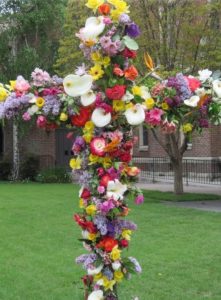
Flowered CrossEmily Huff
The Easter season, this joyous season for celebrating all that is blossoming and flourishing in our lives lasts for 50 days culminating in the celebration of the festival of Pentecost. This is meant to be a season of joy as we celebrate both the resurrection of Christ and the many ways in which the resurrected Christ makes life flourish both in our personal lives and in the world around us.
What will God’s resurrection-created world look like? Obviously none of us can really know. However the prophets give is some wonderful glimpses. I love how Isaiah pictures it in Isaiah 65: 17-25
“Look! I am creating new heavens and a new earth,
and no one will even think about the old ones anymore.
18 Be glad; rejoice forever in my creation!
And look! I will create Jerusalem as a place of happiness.
Her people will be a source of joy.
19 I will rejoice over Jerusalem
and delight in my people.
And the sound of weeping and crying
will be heard in it no more.
20 “No longer will babies die when only a few days old.
No longer will adults die before they have lived a full life.
No longer will people be considered old at one hundred!
Only the cursed will die that young!
21 In those days people will live in the houses they build
and eat the fruit of their own vineyards.
22 Unlike the past, invaders will not take their houses
and confiscate their vineyards.
For my people will live as long as trees,
and my chosen ones will have time to enjoy their hard-won gains.
23 They will not work in vain,
and their children will not be doomed to misfortune.
For they are people blessed by the Lord,
and their children, too, will be blessed.
24 I will answer them before they even call to me.
While they are still talking about their needs,
I will go ahead and answer their prayers!
25 The wolf and the lamb will feed together.
The lion will eat hay like a cow.
But the snakes will eat dust.
In those days no one will be hurt or destroyed on my holy mountain.
I, the Lord, have spoken!”
The, as I read the gospel stories of Jesus I have a fairly good idea. Jesus doesn’t just reveal God to us, he also shows us what God’s new world is like. Through his words and actions we catch glimpses of a transformed world in which all barriers of race and class are removed. It transforms hate into love, scarcity into abundance, greed into generosity, violence into peace and oppression into justice and equality. In God’s new world all lines of separation are erased, the hungry are fed, the oppressed set free and we are invited into a new creation of wholeness and healing, of redemption and renewal.
Just as Jesus’ life was inspired by the in-breaking of God’s resurrection world, so were the lives of the early disciples. They left homes and jobs and family. They turned their backs on the values of Roman and Greek culture and embraced God’s new world and its values of love and mutual care because they believed that in the coming of Christ this new world had broken into ours. They believed that their primary allegiance was no longer to the kings and rulers of this world but to Christ. Through baptism they had become citizens of God’s new world. Their vision became this dream of shalom, wholeness and restoration fulfilled in Christ – a vision of all people including the dispossessed, the excluded and the needy drawn under Christ’s lordship into a single family. Their vision became one in which all persons find a place of abundant provision in a new community that is loving, caring and mutually supportive. They saw all humanity as heirs of a single hope and bearers of a single destiny – the restoration, care and management of all God’s creation in a new heaven and a new earth. Their purpose had become the in-breaking of this new world into the lives of those they met and interacted with.
This is the same vision and purpose that has inspired followers of Christ throughout the ages. It motivated the Celtic saint Brigit to feed thousands each day from the monastery at Kildare and led Francis of Assisi to give up his wealth and privilege to work amongst the poor. It inspired John Wesley in the eighteenth century to not only preach to the poor but to become a leader in many social justice issues. It led William Wilberforce to fight against slavery and Elizabeth Fry to visit prisons in nineteenth century England.
Incredibly, Jesus also invites us to join this great clouds of witnesses throughout the ages and join in the exciting drama of seeing the world changed now in partial ways in anticipation of the day when Christ returns and all things are indeed made whole.
Over the weekend, inspired by Scott Erickson’s Stations of the Resurrection I searched the internet for others who have interpreted the season of Easter with images of hope and promise. Evidently The Stations of the Resurrection follows a spiritual journey with Christ that takes one through fourteen of the events of His post-Resurrection life on earth. Though this was not quite what I was looking for, it was a great place to start. Evidently, in the early Church this practice was known as the Via Lucis, or Way of the Resurrection. It invites participants to walk along a path of transforming joy by following in the footsteps of the Risen Christ and his friends.
Here is a little of what I discovered. I suggest you read Isaiah 65:17-25 several times and then spend time reflecting on these images.
Stations of the Cross and Resurrection by Mary Button. This was one of my best finds which I spent lots of time reflecting on yesterday.
Stations of the Resurrection from the Roman Catholic Diocese of Calgary Canada is great place to visit with several links to stations of the Resurrection both for adults and kids.
Ian McKillop’s 20 paintings of the Stations of the Resurrection which will be hung in Leicester Cathedral are very compelling.
This downloadable Stations of the Resurrection from Church Union in the UK is also a great find.
May we all begin this Easter season with the desire to enter into God’s resurrection world and grow into the people God wants us to be.
Note: As an Amazon Associate I receive a small amount for purchases made through appropriate links above.
Practice Resurrection by Karen Tamminga-Paton www.tammingapaton.com
Practice Resurrection
by Karen Wilk
Practicing resurrection
It’s easy in the spring when we see the new thing
God is doing right before our eyes
Every sunny morning when we rise
The grass is greening, shoots appearing
Birds chirping, skies clearing
The warmth of the day inviting
New growth, new life budding
From the tomb of winter, once so stiff and stark.
We Practice Resurrection out of the cold and dark
But how do we practice resurrection when…
When the ship is stuck
When we’re murking in the muck
And that’s not all –
There’s a wall.
At the wall, I’m foreclosed, forced to stay
Yet, here my illusions begin, like autumn leaves, to fall away
The world is not in our control
We can’t grasp, conceive the whole
Stopped blind, will I find–
The grace, the good, the genuine
The truth that life is not, yours or mine
But there is beyond, above
and wrapped around, a cord of love
Golden, sustaining, maintaining thereof
Life and growth, raising, blazing, whereof
Resurrection’s not up to me, but given
Like water and sun and grace
Could the wall also be for my protection?
— An invitation to pause and discover resurrection
– To feel its warmth, securing my place
To notice the rope’s gentle suspending embrace,
That joins me to the Other,
Sister and Brother, Creator and Mother
Divinity, Trinity,
Holy Being in Community
Now the wall, shadow and light reshaping
Wisely, winsomely, landscaping
All that Eternity has made
I, nor you, need be afraid
Not because concrete doesn’t rise rough
Not because life and death are not tangled tough
But because golden cords are strong and wound around
To bear our weight and settle sprouts in holy ground
Nourishing the sacred, the small, the mustard seed,
In the cupped cuddle of mud’s deep mead
Now a sapling contained yet free
Sparkling, colourful, precious tree,
Responding with joy to my abjection
Here, I practice resurrection.
I recently had an interesting conversation on God’s Facebook page. I’m sure that sounds strange but because we believe that God has entered into the dank depths of human existence, it makes sense that God can be found on social media. Anyway, God asked,
“What’s something that could bring about world peace?”
I responded:
“Really listening to each other. Humility. Forgiveness. Humility. Empathy. Compassion. Love.”
The responses to me were like these:
“I mean, it’s a great idea, but humans being humans, we’d revert almost instantly.”
“Kumbaya thinking has proven to be an incorrect goal.”
“No-one really does that anymore.”
There are others who responded similarly to what I wrote. One person suggested “bacon” which is a definite yes, along with suggestions of nachos and ice cream. And Dolly Parton. The post contained lots of earnest hoping that we might actually be able to achieve peace somehow. There were some who suggested that we just need a supernova to explode or a comet to hit us and end it all. But for those who longed for peace, none knew how to actually get us there.
There is currently a movement across the world towards authoritarian and totalitarian systems. Many of our big institutions, particularly in the political and religious spheres, have been shown to be so mired in their own drivenness towards power and wealth that people have lost faith in them to be able to protect us and to help us flourish. The world feels increasingly scary and out of control. In light of that, it makes sense that a mechanized world—a world marked by order, reason, and utilitarianism controlled by towers of power—feels safer. However, that kind of world reduces each person to a cog in the economic machine and thus each person’s dignity is based upon their ability to produce. Ultimately, it can’t work because humans are not meant to be cogs. So what can we do? In the face of an increasingly dangerous, divided, violent, and cruel world, things like listening, humility, forgiveness, empathy, compassion, and love really look weak and foolish. I believe it’s time for some Holy Foolishness.
Jesus is said to have been a Holy Fool. The archetype of the Holy Fool can be controversial because it can be associated with being a deceiver or trickster. The description of the Holy Fool I use is a person who defies expectations within the norms of society to offer deeper spiritual insight or wisdom. Holy Fools remind us of a reality that is far more beautiful and life-giving than a mechanized state. Jesus, the Holy Fool, taught some preposterous things. Think of the Sermon on the Mount in which he taught that the poor in spirit are blessed, as are those who seek after meekness instead of power, or who pursue peace instead of revenge. No one wants to be poor in any way or to place themselves in a position of powerlessness. Jesus taught us to love our enemies, which feels impossible as well as foolish in a competitive, violent world. He was offering something new that seems preposterous.
St. Francis of Assisi was a Holy Fool. He would walk around naked, after giving his clothing to a beggar dressed in rags or less. Doing so scandalized others—including his wealthy father—to make a point about the inequity of riches in both the church and society, but more importantly, to express the worth and dignity of the poorest, least powerful people. In Francis’s day, those afflicted with leprosy were required to wear bells to warn others that they were nearby to prevent the spread of the disease. They led a lonely and desperate life. At one point upon meeting a leper, Francis jumped off his horse and kissed the leper on the mouth. Holy Foolishness can compel us to do strange and unbecoming things for the sake of love.
Fyodor Dostoevsky uses the archetype of the Holy Fool quite frequently in his novels. In Crime and Punishment, the character of Sonya is a young woman is filled with faith and goodness. She sacrifices herself to support her destitute family by becoming a prostitute. Prostitution was one of the few ways a woman could earn a living in a time when there were few opportunities or safety nets for her. How often did the Holy Fool Jesus see faith and goodness amongst the “sinners” of his day? Sonya’s unmerited, genuine love for the character Raskolnikov, a man who is continually descending into deeper depths of hellishness, compels her to descend into the Siberian labor camps with him, even as he continues to scorn her love. Who does that? Eventually, her love manages to pierce through the darkness of Raskolnikov’s heart. Catholic writer Renée D. Roden says, “Sonya’s love is Christic, kenotic, and total self-gift, illogical outside of the economy of agape.” Holy Foolishness is indeed illogical but brings love into the most desolate of places. Theologian Hans Boersma says, “Holy Foolishness is patterned on the Incarnation, the true face of God’s love,” that is, it is not a rescue from this world but it shows up amidst real human lives with real people right here, right now.
Holy Foolishness bids us to listen to those who we just know are wrong. “Listening with the ear of your heart” is a pillar of Benedictine spirituality. To listen comes from the same root word as to obey. Essentially, we listen with compassion and an openness to be changed by what we hear. We listen with a willingness to align with the dignity of another. That doesn’t mean we compromise what we know is good, but that we find a deeper way to come alongside others, such as recognizing in them the very same fears and hopes we have, and the preciousness of our shared humanity. Listening does not happen when we believe we already know what the other is like. “Be curious, not judgmental,” says fictional soccer coach Ted Lasso, another holy fool. Curiosity and judgment cannot co-exist.
Humility is another Benedictine pillar. It’s all about the act of self-emptying that makes it possible to lay aside our egos for even a few moments so that we may make space for others to be. Humility, of course, is now seen as weak and and ineffectual. However, humility opens us to learning from all others, refuses to denigrate others, and trains us in the way of what it means to lay aside pride and defensiveness so we may offer hearts of openness and peace. It also leads us into the secret of being content in all circumstances and letting go of envy—a decidedly un-capitalist virtue.
Forgiveness, in the most basic understanding of it, is the refusal to retaliate for a wrong done to us. The ability to extend pardon and even love to those who have hurt us is what makes us most like Jesus, the Holy Fool. Humility allows us to see that we are in need of forgiveness ourselves. Likewise, empathy and compassion may also appear to be laughable today, but they mimic Christ in his willingness to enter this world and its wounds (empathy—to experience with) and his willingness to suffer with us all (Latin compati). Both are fruits of Love. Love is dismissed because it is viewed as mere sentiment or “kumbaya” as one commenter mentioned. But love is no mere sentiment. It requires everything of us. An orthodox theologian once said, “The church in the West has not yet encountered the Christ.” I think he is correct—it’s much easier to wave around values to be imposed on everyone, or to market “be your best self” versions of spirituality instead of the cruciform path of love. Real love is utterly foolish but it changes us from the inside out, one person at a time.
Real love compels us to awaken to what the reign of God could look like right here, right now. It is a reign of justice in which all have what they need, and thus all are free to flourish. It is a reign of long tables and abundant feasts, where the only law is love, written directly onto our hearts. Everything in this harsh world teaches us that judgment, punishment, and control are the only way to regain order. And historically, once this form of order is obtained it is always at the expense of some for the benefit of others. It is not this way with Jesus, the Holiest of Fools. We cooperate with the in-breaking of this Kingdom as we choose to be Holy Fools in a world fraught with weapons and terrorists and cruelty. What if we believed that the foolishly cruciform path of the Holy Fool truly is the way to peace and new life? Is that not the Paschal story?
I listen daily to those who have been steadfastly deconstructing their faith from something that has resembled the violence and divisiveness of the world far more than the foolish way of Jesus. They want to find something real, something that makes a difference. They want to believe that love wins. So do I. The “weak” and “illogical” way of the Holy Fool is like a gentle rain, which is seemingly innocuous and ineffectual against big powerful things but eventually loosens the hardened soil around those towers of power, exposing their false foundations and weakening their stranglehold on us all. As G.K. Chesterton has said, “The Christian ideal has not been tried and found wanting. It has been found difficult; and left untried.” What if for our Easter observance this year, we tried the foolish way of Love?
1 Elizabeth-Anne Stewart, Jesus, the Holy Fool (Franklin, WI: Sheed & Ward, 1999), 172.
2 Fyodor Dostoevsky, Crime and Punishment, trans. David McDuff (New York: Penguin Books, 2003), 655.
Renée D. Roden, “Witness of the Holy Fool,” Church Life Journal (April 6, 2017), https://churchlifejournal.nd.edu/articles/witness-of-the-holy-fool
3 Hans Boersma, “Jesus the Holy Fool,” First Things (January 12, 2023), https://www.firstthings.com/web-exclusives/2023/01/jesus-the-holy-fool.
4 St. Benedict, The Rule of St. Benedict, ed. Timothy Fry (Collegeville, MI: The Liturgical Press), Prologue 1.
5 I highly recommend watching this series to observe the wonderful portrayal of a holy fool in the character of Ted Lasso. Ted Lasso, (Apple TV+, 2020-2023).
6 St. Benedict, The Rule of St. Benedict, ed. Timothy Fry (Collegeville, MI: The Liturgical Press), Chapter 7.

Breath Prayer Cards
We are all born knowing how to breathe, but often need to be taught how to breathe properly. Deep abdominal breathing for five minutes several ties a day where we consciously fill our lungs can reduce stress, calm our minds and help us center on the loving presence of God. Each breath that we take is a breathing in of the life of God.
Uniquely designed with a breath word and prayer, each card will help lead you into a powerful meditation. Set of 12 prayers designed by Hilary Horn, text and photographs by Christine Sine.
Jesus took the cup of suffering for each of us on that Friday.
He was human, and like us, he desired that cup be taken from him so he didn’t have to feel the pain.
He prayed for that three times
Yet he obeyed the father and trusted him.
Jesus was willing to drink from that cup.

cup of suffering
On the cross
Human like we are
Jesus was thirsty
He was dying.
He was thirsty.
He didn’t get that cup of cold water
Jesus didn’t get reprieve from his pain
Jesus got a sponge filled with vinegar to soothe his parched lips
Like Jesus, today I too am thirsty
Thirsty for love
Thirsty for peace for our world
Thirsty for justice and an end to racism
Thirsty for an end to hatred and gun violence, greed and war.
But you and I don’t always get a cup of cold water. We don’t always get the refreshment we desire.
Can I trust that Jesus knows that I am thirsty too?
Am i willing to trust the cups that God brings my way?
Are we willing to drink from them anyway?
Am I willing to drink from the cups that might cause me pain or the ones that belong to people i don’t like?
Too often I want my own cup, my own way.
I want a cup of joy not sadness
I want a cup of love not suffering
I want a cup of abundant lemonade not lament!

Easter Cup
I don’t always like the cups I’m given to drink from ….how about you?
I need to go back to the Last Supper. I need to go back to Thursday night and drink from that cup that Jesus passed around the table to help us remember him.
And really take time to remember HIM and his love and how he lived out love in a very broken and hostile world.
I need to quench my thirst with the Cup of the New Covenant….The Cup of the New Kingdom.
The Cup of Love for all people. The Cup of forgiveness.
Jesus took the cup of suffering and is with us in our suffering
He took the cup of suffering on that Friday and gave us a new way to live.
A Meditation on the Last Words of Jesus
READ/Listen to and Consider the WORDS of JESUS from the Cross
Read what Jesus said from the cross:
“Father, forgive them; for they know not what they do.”
Luke 23:34
“Truly, I say to you, today you will be with me in Paradise.”
Luke 23:43
“Woman, behold, your son!”… “Behold, your mother!”…
John 19:26-27
“My God, my God, why hast thou forsaken me?”
And at the ninth hour Jesus cried with a loud voice, “Eloi, Eloi, lama sabachthani?” which means, “My God, my God, why hast thou forsaken me?”Mark 15:34
“I thirst.” After this Jesus, knowing that all was now finished, said to fulfill the scripture, “I thirst.” John 19:28
“It is finished”;
John 19:30
“Father, into thy hands I commit my spirit!”
Then Jesus, crying with a loud voice, said, “Father, into thy hands I commit my spirit!”
And having said this he breathed his last. Luke 23:46
What touches you today? Which of these sayings speaks to you? What do you need to hear from Jesus today?
Do you need to be forgiven?
Or do you need Jesus to help you forgive others?
Do you need to know that Jesus wants you to be with him, now and in the future?
Do you need certainty ?
Do you need to know you are not forgotten or abandoned like Mary and John?
Are you feeling forsaken?
What are you thirsty for today?
Do you need the reminder that Jesus is here in the midst of your suffering? That he finished it on the cross?
Are you in need of the reminder that you too are in the hands of the Father? that you too have the Holy Spirit?
Talk to God about where you are today in the middle of this crazy world we live in. Ask Jesus to show you how he is here with you.
DRAW and OUTLINE OF A CROSS
Write down on the cross what you are feeling today.
What do you need to hear from Jesus today? Write that on the cross too.
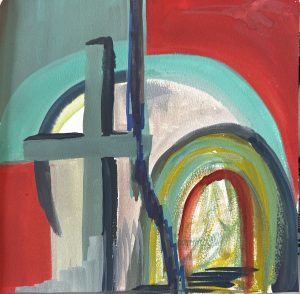
by Lilly Lewin
by June Friesen
Maundy Thursday is not a term that is used in the Scriptures. I also have to admit that it is not a term that I was familiar with until later in my adult life. As I researched this term and day, I found that it is a term given to the Thursday before Good Friday in England. In many or most other countries it is referred to as Holy Thursday. So where does the word Maundy originate or what is its meaning? Maundy is the term that designates the rite of ‘foot washing’ in the Christian church that is practiced after the example of Jesus washing the feet of His disciples at the Last Supper. This was His final time with them before His arrest, trial and crucifixion. John 13 is where this story was recorded in detail.
John 13 1-2 Just before the Passover Feast, Jesus knew that the time had come to leave this world to go to the Father. Having loved his dear companions, he continued to love them right to the end. It was suppertime. The Devil by now had Judas, son of Simon the Iscariot, firmly in his grip, all set for the betrayal.
3-6 Jesus knew that the Father had put him in complete charge of everything, that he came from God and was on his way back to God. So he got up from the supper table, set aside his robe, and put on an apron. Then he poured water into a basin and began to wash the feet of the disciples, drying them with his apron. When he got to Simon Peter, Peter said, “Master, you wash my feet?”
7 Jesus answered, “You don’t understand now what I’m doing, but it will be clear enough to you later.”
8 Peter persisted, “You’re not going to wash my feet—ever!”
Jesus said, “If I don’t wash you, you can’t be part of what I’m doing.”
9 “Master!” said Peter. “Not only my feet, then. Wash my hands! Wash my head!”
10-12 Jesus said, “If you’ve had a bath in the morning, you only need your feet washed now and you’re clean from head to toe. My concern, you understand, is holiness, not hygiene. So now you’re clean. But not every one of you.” (He knew who was betraying him. That’s why he said, “Not every one of you.”) After he had finished washing their feet, he took his robe, put it back on, and went back to his place at the table.
12-17 Then he said, “Do you understand what I have done to you? You address me as ‘Teacher’ and ‘Master,’ and rightly so. That is what I am. So if I, the Master and Teacher, washed your feet, you must now wash each other’s feet. I’ve laid down a pattern for you. What I’ve done, you do. I’m only pointing out the obvious. A servant is not ranked above his master; an employee doesn’t give orders to the employer. If you understand what I’m telling you, act like it—and live a blessed life.
In the Christian Church, there are some churches that practice foot washing and others that do not. When we look at the history of foot washing in the Biblical times it was not necessarily a ‘religious practice’ but rather was a courteous practice provided by a host/hostess as guests came to their home. This was offered because most everyone either walked in bare feet or with sandals and their feet became very dusty/dirty. No doubt sometimes there were even small cuts or punctures from stickers, stones etc. that were on the pathways. This was usually a task that was provided by the servants of the household rather than the host or hostess. Given this history of foot washing one can understand why Peter, who we recognize as the outspoken one, responded as he did.
Another consideration in this record is that Judas would have been present for the foot washing. How would Judas have felt? Do you think there were any quiet words exchanged between Jesus and Judas? Another couple of questions I have are: did Jesus speak any words to Judas as He washed his feet? How did Judas respond or feel being a part of such an intimate setting knowing what he was going to do in a few hours? I have to admit that meditating upon these verses, trying to put myself in the place of the disciples caused me to seriously consider: how would I have responded or would I respond to Jesus even today if He appeared with a towel and basin of water and sat down at my feet?

JESUS SITTING AT MY FEET
Today Jesus is inviting me to come –
To come and sit in a chair and be with Him –
I look into His face –
I see an invitation of love in His eyes –
I see a smile of peace upon His lips –
I come with hesitant step –
I motion for Him to sit instead
As I have always heard
That I should come and sit at the feet of Jesus.
Yet, Jesus is insistent
And even pats the seat as He once again invites me to sit –
And then I sit – – – –
As I sit I see Jesus then
Reach behind me –
When He comes back in front of me –
He has a towel over His arm
And a basin of water in His hands –
Surely He is going to ask me now to wash His feet.
But no –
What is He doing now?
This cannot be –
He is setting the basin at my feet –
He then sits down at my feet –
And gently, ever so gently He takes my feet –
One foot at a time – – – –
And places them in the basin of water –
My mind, my spirit –
What in the world is happening here – –
And then I feel His Hands gently bathing my feet –
How soothing His Hands are not only to my feet but to my spirit as well –
He looks up into my eyes with tender love and acceptance –
That invite me to relax, let go –
And embrace His gentle love as He prepares my feet
To begin a new walk with Him in the days ahead.
Then He gently takes my feet and places them in the towel,
He gently pats them dry and I hear His voice once again:
“Bless my dear child Father,
On their walk here on this earth,
Guide their feet over the path they will be given to walk,
Help them maneuver through the rough terrain
Of rocks, ruts, puddles, slippery mud, uphill and down –
When they stumble give them a hand to steady their step,
When they fall give them a hand to help them up,
When they are discouraged and don’t know which way to turn
Call in Your own gentle way, Father
Directing them to where You are taking them –
Thank You Father for this precious child –
Thank You for watching over them all the way
Until You and I have their home ready for eternity –
And then help them to take that last step
When I can reach out and say –
‘Welcome home my child – your eternal home is ready now
Where you can live forever with my Father and I.
Signed, Jesus
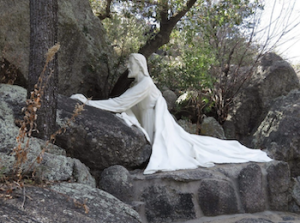
Photos by June Friesen. Scripture is from The Message translation.
May You who establish peace in the heavens, grant peace to us….
From Mourner’s Kaddish
Jesus said to her, “I am the resurrection and the life.
John 11:25
Just an old, sweet song, keeps Georgia on my mind
Stuart Gorrell/ Hoagy Carmichael
My mother, Georgia S. Borror died on March 8th, 2023. For the last year, when I have attended the Friday night Shabbat service at my wife’s synagogue, we stood and prayed the Mourner’s Kaddish with others who have lost loved ones. Having access to this practice for the first time in my life has been meaningful in ways I cannot fully articulate. Mom’s service was the week after Easter, and I do believe in the hope of the Resurrection. But life is lived on this side of the Cross. Being able to publicly acknowledge my loss by standing and praying has been a kind of yearlong acknowledgment of mortality and “from dust you came…”
It has also been a time of recalibrating my relationship with Mom. Attending to the well-being of my mother after my father’s death was a constant calculus of figuring out what was best for her, what was needed, what was realistic. Even when you were doing what was best, it never felt good or enough. Since her death, there have certainly been moments of sadness wishing she could have met her latest great grandsons or being sorry she never got to visit us in Vermont, which she would have loved. But for the most part “Georgia on my mind” now is marked by gratitude and appreciation for being fortunate enough to have been loved so well by such a strong and spirited woman.
The paradoxes of grief and love, of death and hope that are the marks of both life and the season of Lent, are poignantly portrayed in John 11. We are told that Jesus loves Martha, Mary, and Lazarus (11:5). In the midst of bearing the brunt of Martha’s sorrow, anger and disappointment, Jesus promises himself as the guarantee and comfort of the Resurrection (11:25). But even though there will be a miracle, Jesus also grieves with the broken hearted (11:35).
I recently read a post by the lyricist Lenora Rand, who, evoking Bob Dylan stated, “Why Practice Lent? Because Everything Is Broken.” That is why grief and Lent make for congruous companions. But so are hope and resurrection fitting traveling partners. And somehow being on the road with Jesus holds them all together.
What do you need this Lenten Season? What are you longing for as you look towards Easter? How can we create Beauty from the Ashes of the past two years?
Join Christine Sine and Lilly Lewin in this virtual retreat as they guide you to lay down grief and gather joys through the journey of Lent. This online course was adapted from a live virtual retreat.
As an Amazon Associate, I receive a small amount for purchases made through appropriate links.
Thank you for supporting Godspace in this way.
When referencing or quoting Godspace Light, please be sure to include the Author (Christine Sine unless otherwise noted), the Title of the article or resource, the Source link where appropriate, and ©Godspacelight.com. Thank you!

